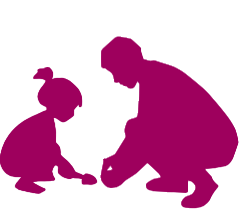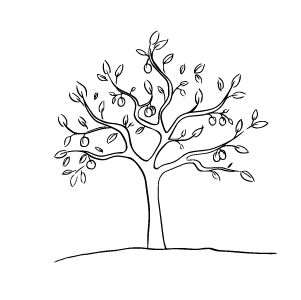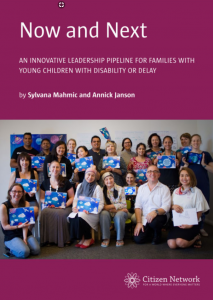Our Theory of Change
Building family capacity through participation
Our Theory of Chance aims to build family capacity through participation. It accomplishes this by running evidence-based programs to increase families’ empowerment, hope, agency and wellbeing.
In peer groups (F2F or online), parents and carers learn to:
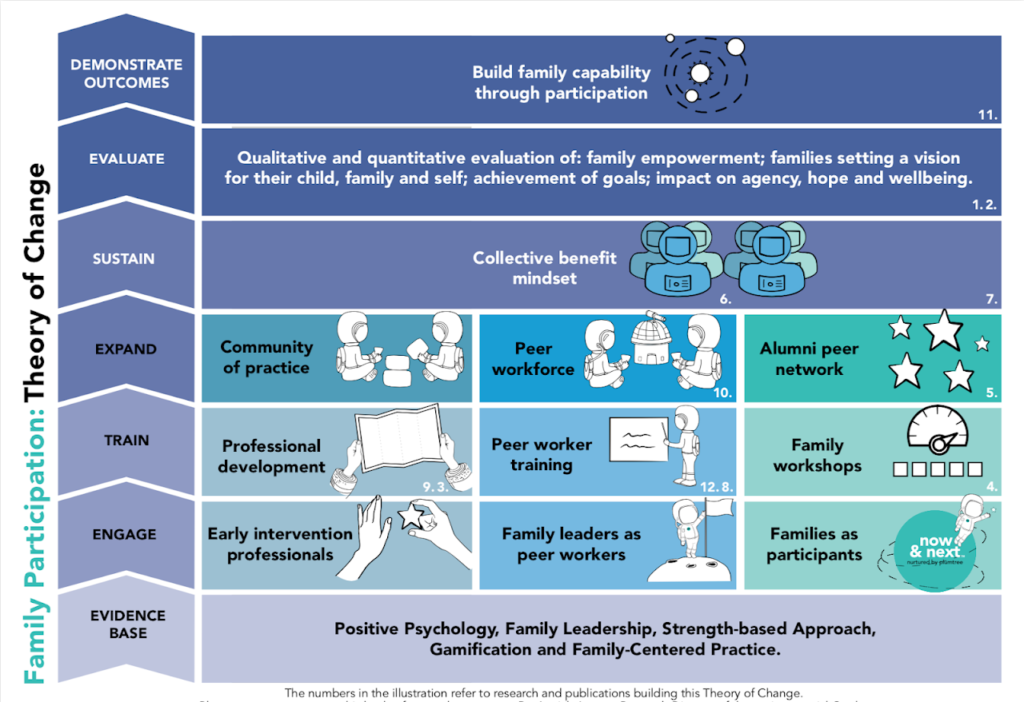
Engage
To reach the outcome of building family capacity through participation, we addressed three audiences so that everyone could work together in partnership and use the same approaches.
Engaging educators and health professionals
We designed two professional development workshops that give early intervention staff firsthand experience of the family-centered processes and tools that we use to engage families in the Now & Next program.
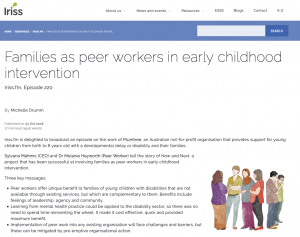
Pictability experiential training for professionals
Pictability is based on a completely new approach to planning. It is a fun, gamified way to help families explore new possibilities when setting a vision and planning to achieve positive outcomes. Pictability gives parents and carers clarity for the future and inspiration to get started. In this practical workshop, we give practitioners the same experience in which they:
- Receive a Pictability kit for their personal use
- Experience Pictability to set short and long term goals for a child, family and self.
- Trial the tools to create a personal vision and a vision for their child and family [or a child and family they work with].
- Prioritise three goals and identify practical steps to achieve them.
- Learn how to guide others to formulate their own Family Vision Statement, including how they partner with professionals.
- Learn about some of the core theoretical tenets of Positive Psychology planning and how these impact on their planning and objectives
Read feedback from Australian professionals here and watch below, the reflections from Canadian Jodie McKenzie, Finland KVPS team and North American Lea Ann Christenson after their Pictability experience.
Growing family commitment
What parents can teach service provider
A versatile visioning tool
Working with parents who have a learning disability and at school
A practical way to plan
Personal insights of a professional
Dr. Colette Muir, New Zealand Starship Hospital Paediatrician reflects how Pictability can help parents communicate their vision to professionals. Click here for a series of testimonials from professionals who have done the Pictability Experience of Pictability Facilitator Training.
Now & Next program for parents – A unique experiential training
Now & Next is a unique, peer-led group program for families of young children who have developmental delays or disabilities. In this practical workshop we give practitioners an initial experience of the program in which they:
- Receive the bespoke Now and Next mindfulness colouring book
- Experience setting a long term vision for their family, child and self, then set a short term goal.
- Learn about the supporting evidence from positive psychology and bridge theory and practice through experiential exercises.
- Familiarise themselves with the outcome measures of goal achievement, hope, empowerment and wellbeing collated through the Now and Next programme.
In the video clips below, New Zealand Trisha, Director, McKenzie Centre for early intervention in Hamilton explains how they have been working with Now & Next in the past two years. http://www.mckenziecentre.org.nz/41/pages/30-now-and-next. Julie, Speech Therapist, Plumtree, Australia shares her observations about the benefit for families to do the Now and Next program. Julie observed that the families she works with show not only short term but long term gains such as: growing more empowered, forming better partnerships with professionals and reducing the frequency of their children’s therapies. Gareth, Director, Family and Children Services, Kinsight, and Tanya a colleague from Vancouver, British Columbia, talk about how this approach is bringing together a lot of the threads that they want to pull together.
Our international research program
Families use more empowerment language with professionals
New partnerships with families
Families apply their learning beyond the program sessions
The Now and Next experience is ‘sticky’Why this approach resonates with how organisations want to partner with families.
Achieving goals
Heather from CCS Disability Action, New Zealand shares that graduates from the program have learnt are excited to follow through with working on their goals after the program ended making it easy for her to continue supporting the families because they are clear on the direction that they are heading in.
Engaging family leaders as peer workers
Now & Next is a by families for families program co-created by two mothers who have adult children with disability and co-designed with families. Facilitators of the program are trained in peer work in order to build a pipeline of family leaders who have the skills and confidence to support families through a wider range of peer work roles.
With a grant from the Innovative Workforce Fund in 2017, Plumtree undertook a project to research, document and develop resources to support the introduction of families as peer workers in early childhood intervention organisations. Research drew from the experience and evidence of peer workers in the mental health sector, and those working at Plumtree. The project promoted peer workers as a new, untapped workforce that should be used more in the disability sector.
The resources produced include:
- At a glance: Families as peer workers in Early Childhood Intervention
- Literature Review on peer work in mental health and ECI
- Guide and resource toolkit to support peer workforce integration in ECI organisations
- Report on peer worker use in ECI organisations by the Centre for Disability Studies, University of Sydney
- Knowledge Translation strategy and action plan to disseminate key project messages
‘A commitment to family-centred practice is the cornerstone of the National Guidelines Best Practice in Early Childhood Intervention (ECIA, 2016), which encode the principles that professionals use to guide and improve their family-centred practice. However, relying on the role of professionals to increase family-centredness without addressing the dynamic role that families can play in this practice under-utilises families’ potential to contribute actively to the parent-professional partnership. We need to identify and develop new ways to harness the involvement of families since, ultimately, it is they who will make the deepest impact on their child’s development throughout their child’s life. Peer work is one important way we can activate family engagement. When peer work is done well, it has the potential to create a mindset shift through the sharing of personal experiences and perspectives. The use of paid peer work in early childhood intervention (ECI) is not widely prevalent yet it is precisely at this time that families would benefit from systematic connection with knowledgeable peers.’
Sylvana Mahmic CEO Plumtree Forward, Guide and resource to support peer work in ECI organisations 2018.
Listen to a podcast about the project broadcast by Scotland’s Iriss FM by Dr Melanie Heyworth and Sylvana Mahmic from iriss.org, or click on the illustration below.
Engaging family as participants
For many years, practitioners have been grappling with the challenge of how to build leadership in families with young children with disabilities and developmental delays, even though we know that starting this leadership journey early offers significant promise of fundamental and long-lasting change for families. In an attempt to address this we developed a program with a potential solution to this problem.
The Now and Next program has emerged in the context of the Australia-wide rollout of the National Disability Insurance Scheme (NDIS), a national health-care initiative, which promotes independent, outcomes-based management of funding plans for individuals with disabilities. There is a demonstrated need to place a greater focus on the role of families in participating as partners in early childhood intervention by engaging them as early as possible.
During the initial period after diagnosis, families often become intensely focused on gathering information, and finding and then engaging services, in an effort to maximise the benefit of early interventions for their child. Many families look to increase therapy services at this time, and fail to appreciate that the single most significant impact on the child, is the family (Mahoney, 2011). Years may pass before families recognise the importance of investing in their own capacity, and even then, learning how to do this is an ad hoc process with scarce resources to assist them. While some capacity building initiatives are provided by advocacy organisations, these do not specifically target families of very young children (Escalon, 2016). By integrating family capacity building activities within early childhood intervention services, targeted, intentional programs can reach and impact this population, as we will show. It is in the long-term interest of families that they have multiple opportunities for capacity building from the earliest possible point, which will lead to better outcomes for the child and family as a whole.
Some theorists have also outlined the potential for an unequal power differential between professionals and families raising disabled children, in which the former are held as the preeminent ‘experts’ who have all or most of the answers. For professionals to shift their power from expert to embrace a family’s expertise and perspective, they must adopt Dunst and Trivette’s theory (2009) that family capacity building can be undertaken through the Family Centered Approach. This radical change has not yet spread in the sector. The challenge is to make it happen now and to change the parent-professional power relationship, requiring professionals to forgo some of the power they have wielded until now (Allread, 2015). As partners families also have a responsibility to change the status-quo and create effective partnerships with their professionals.
Family-centred practice is central to the best practice approach in early childhood intervention (National Guidelines on Best Practice in Early Childhood Intervention, 2016). Research on family-centred practice has led to an update of the model to highlight the element of intentional capacity building as a mediator of the benefits for intervention with families (Dunst & Trivette, 2009). The capacity-building paradigm uses a strengths-based approach to focus on building the supports, resources, experiences and opportunities for parents, children and families. However, despite over 20 years of evidence reinforcing this approach, it is still common for families to experience traditional deficit-based models where professionals are situated as experts to the detriment of parental expertise.
Family-Centered Practice research has highlighted the element of intentional capacity building as a mediator of the benefits for early intervention with families (Dunst & Trivette, 2011). By integrating family capacity building activities during the early childhood intervention period, we have shown that targeted, intentional programs can reach and engage this population. It is in the long-term interest of families that they have multiple opportunities for capacity building from the earliest possible time as this will lead to better outcomes for the child and family as a whole. Training to enrich professionals’ skills at building partnerships with families can only carry us half of the way. Families need to build the bridge from the other side and prepare themselves for this partnership, stepping into a new space and positioning themselves as active partners. This paper shows how families learning together can create new discussions with professionals to bring about new outcomes for their child and families.
In our first year of operation we carried out a number of pilot programs to test family engagement. The 7 mins video clip below presents the feedback from parents who participated in these pilots:
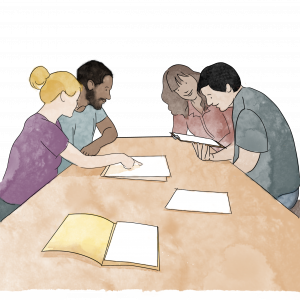
Train
Professional development
We have trained early intervention professionals in Australia, New Zealand, Canada and Finland to be Pictability Facilitators.
In 2018, we received ECIA funding to train 270 NSW Early Intervention professionals in the sector. Together with our international partners, we have launched a number of research projects.
Publications about the impact of the Pictability experiential training on practitioners:
- Publication: Janson, A. (2019) Measuring empowerment and engagement of Early Intervention practitioners training to facilitate Pictability a novel vision setting tool. [Submitted for peer review- pre-publication proof]
- Presentation: Williams, G & Janson, A. (2019) Experiential training in novel ‘participatory engagement mechanisms: Early Intervention practitioners share their learning. International Society on Early Intervention (ISEI) Conference. Sydney, Australia (June 25-28).
Click here to view some snapshots and commentary from our professional development in New Zealand; below are some photos taken during our meetings with professionals in Australia, Finland, Canada, New Zealand, Israel, United States, Montenegro and France.
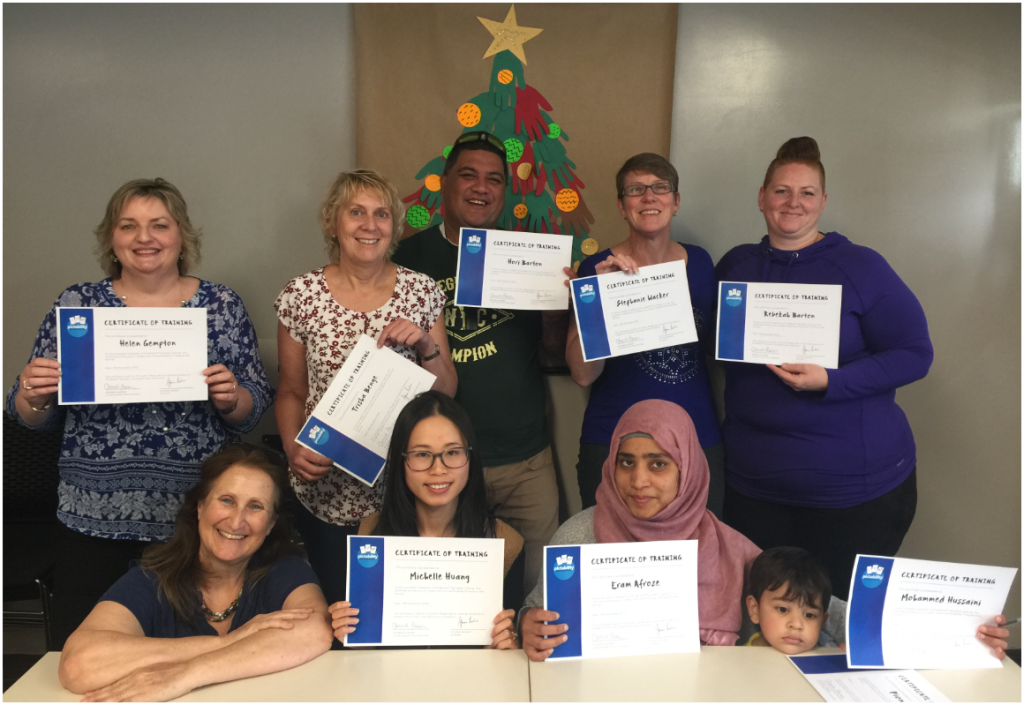
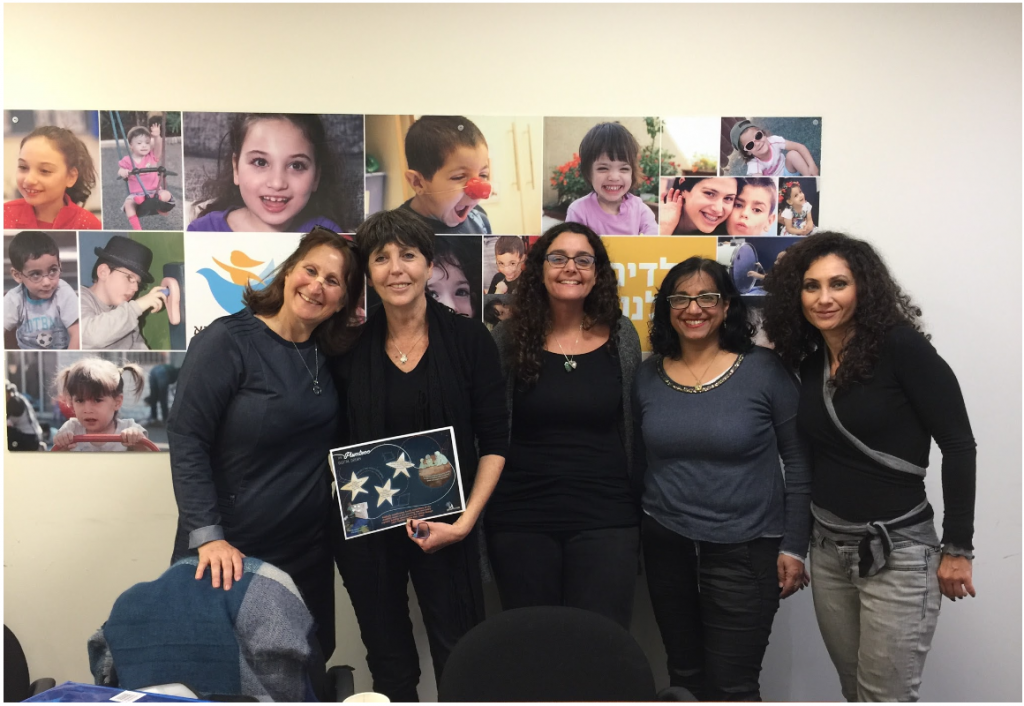
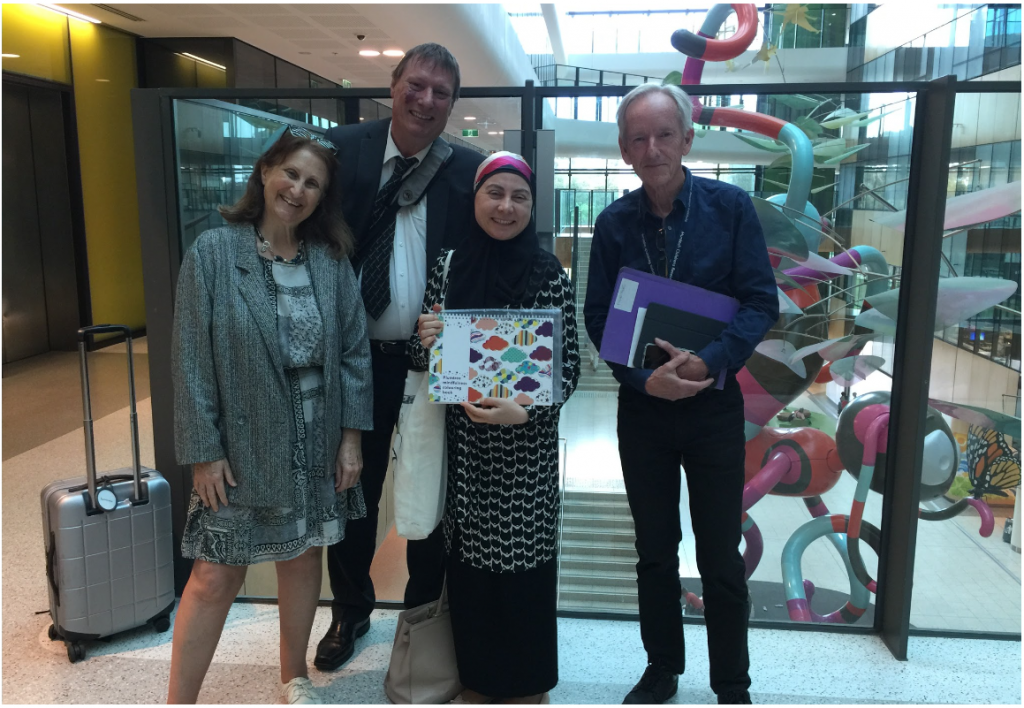
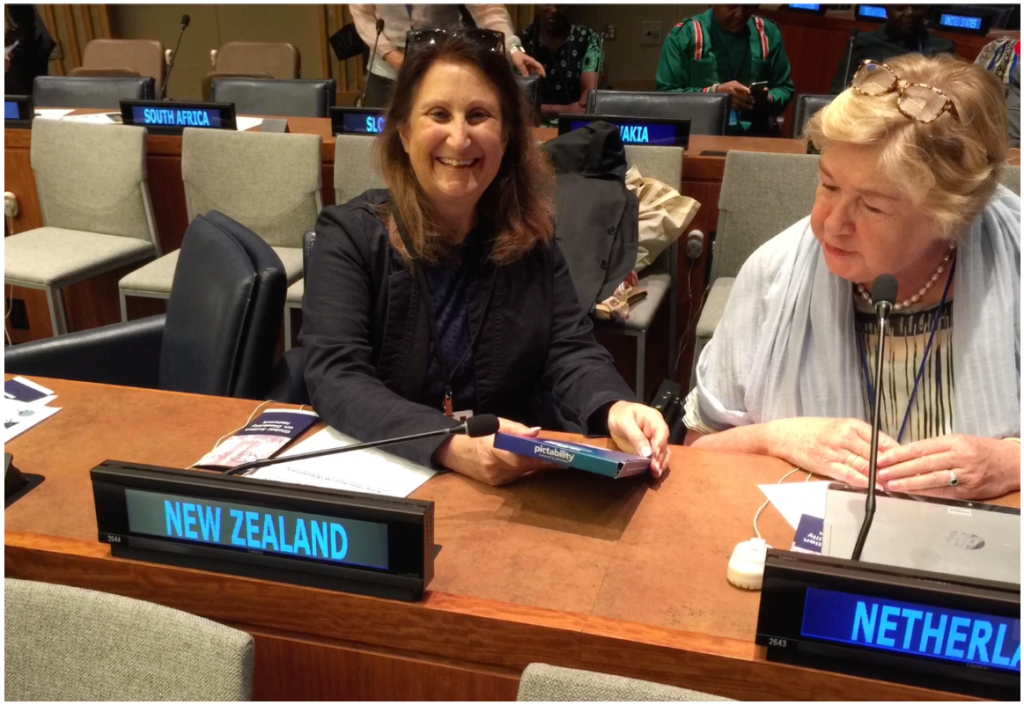
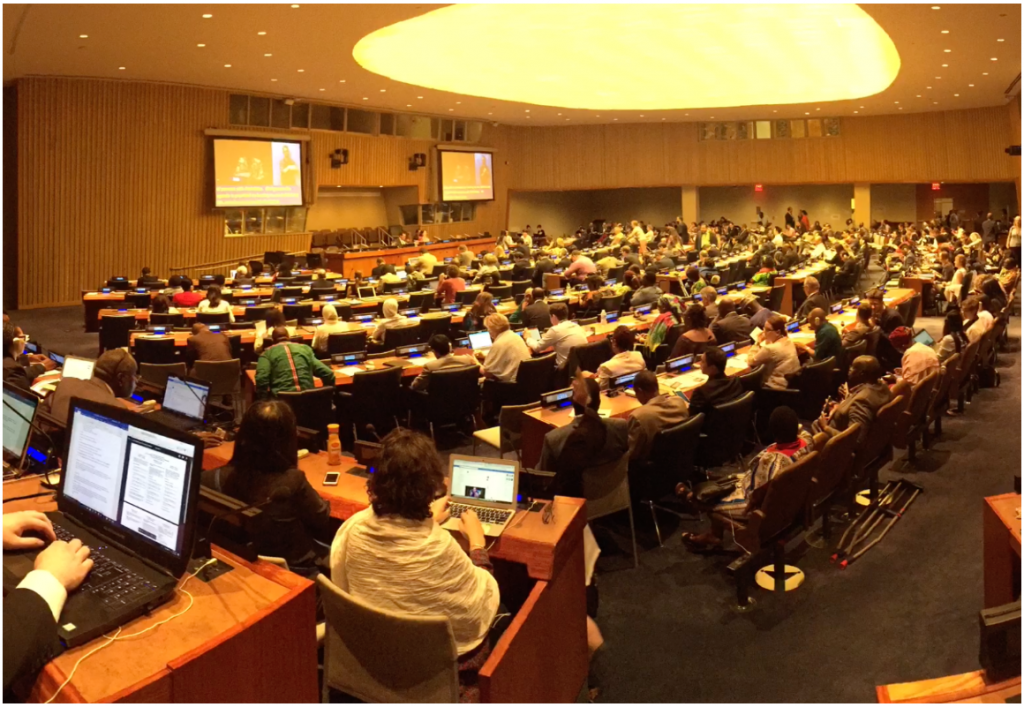
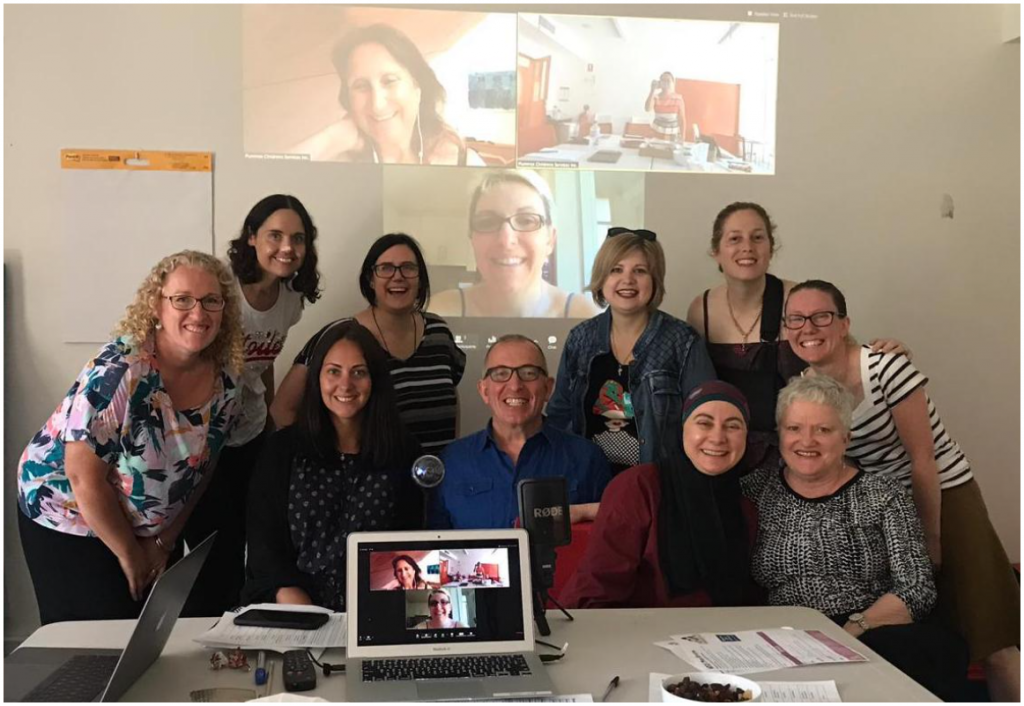
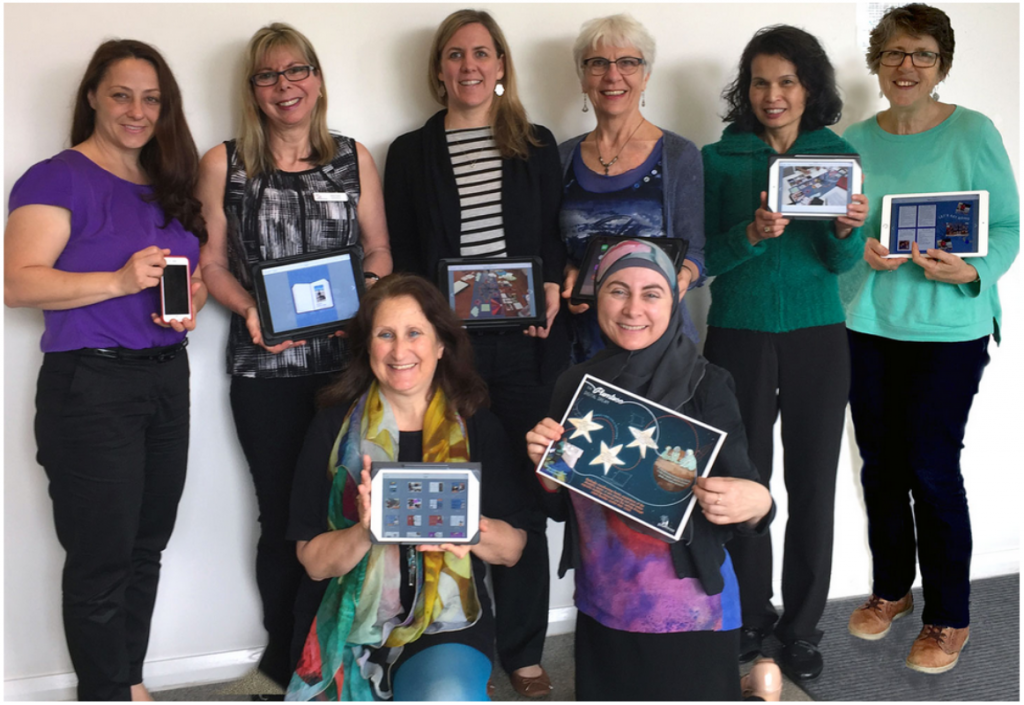
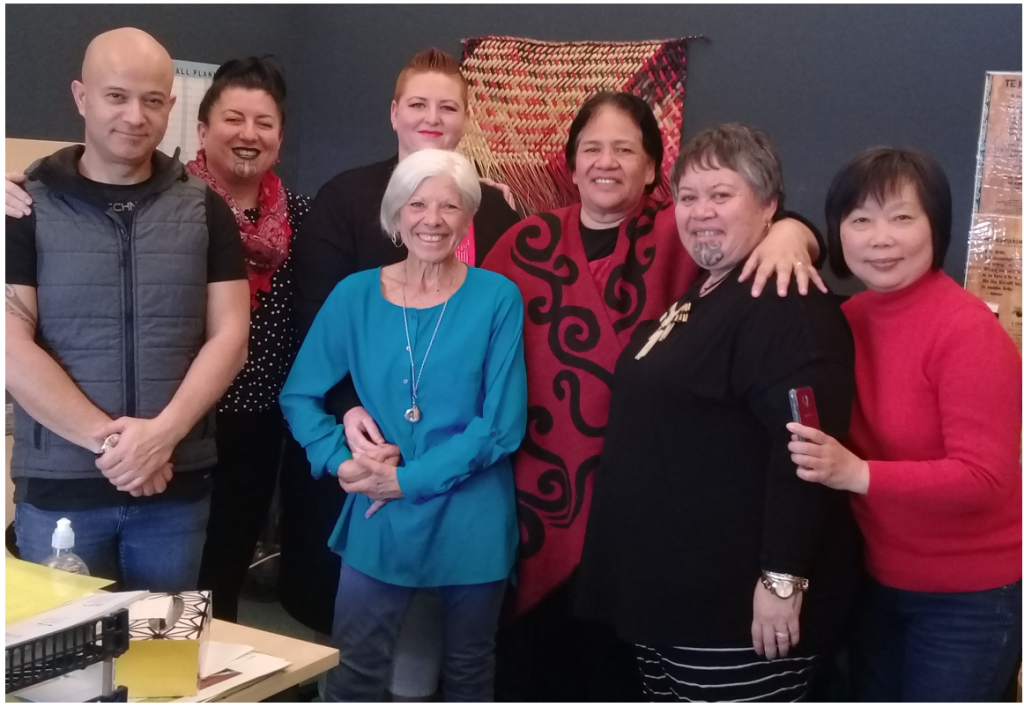
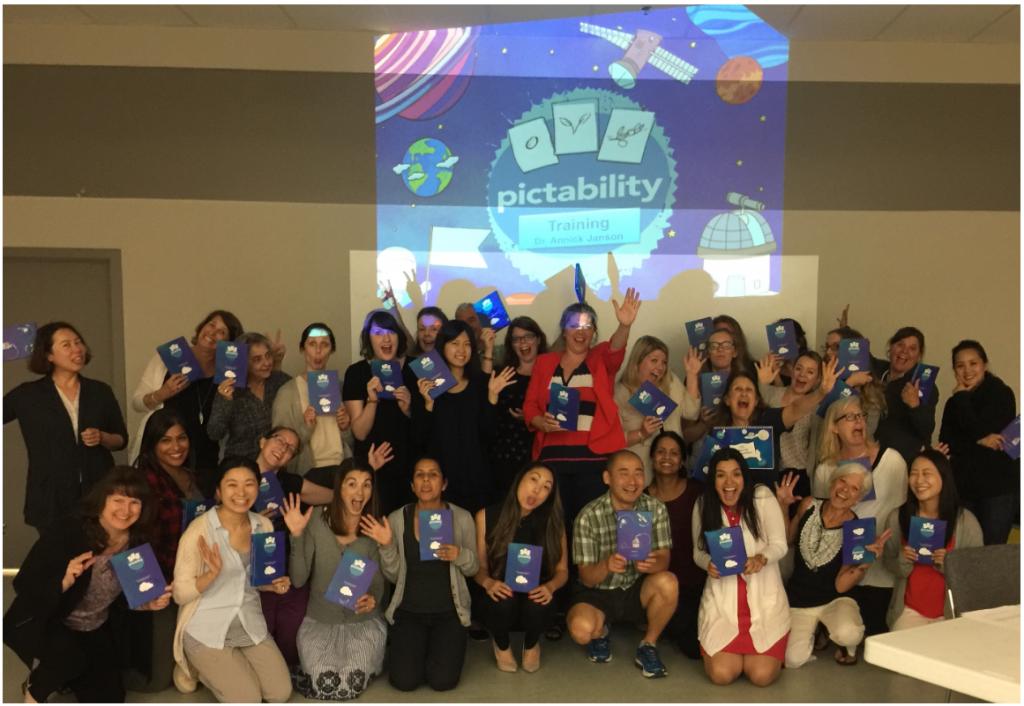
Peer worker training
We train graduates to facilitate Now and Next and other programs but the role of a peer facilitator is only one of the ways that families can contribute their expertise as a peer worker.
Training provided to families so that they can facilitate the Now and Next program includes:
- Background of the program
- Parent professional partnerships
- Setting a vision and creating short and long term goals
- Theoretical background
- Training on specific elements of the program
- The role of peer worker including setting and maintaining boundaries, the difference between peer support and clinical advice,
- Person centred facilitation
- Practical issues relating to employment such as: privacy and confidentiality; legal obligations such as Working With Children Checks, child protection and Mandatory Reporting; employment details specific to the organisation they are working in.
What makes peer workers so effective in their interactions with families, is their potential to encourage quality relationships with families. We call the unique relationship between Peer Facilitators and parents ‘high-trust, low distance’. This dynamic is exactly what makes Peer Facilitators so effective and distinctive. As Davidson et al. (1999) point out, what makes paid peer workers unique and special is their access to a ‘consumer’ point of view, and their shared lived experiences which foster empathy, mutual support and acceptance in the families they assist. It is important to preserve what makes peers workers unique and resist the urge to ‘professionalise’ peer workers: peer workers are most effective when they do not simply approximate or replace traditional non-peer staff (Davidson et al., 1999). Click on the link below to hear from Kylee why she is inspired about being a Peer Worker.
Family workshops
We see capacity building with families as an ongoing focus which starts as early as possible and continues building throughout their child’s life. This requires continued investment and multiple opportunities over time.
As of June 2019 we have held 38 Now and Next groups for over 400 participants, two alumni conferences with the third scheduled for October 2019 and 12 alumni training events.
We have also piloted two new programs which focus on building family capacity for their school age child.
Please follow this link for more information, including two short video clips about these programmes: https://tinyurl.com/flagship-programs
The below left link leads to a 1 min clip describing Pictability and the below right link leads to a 3 clip by parents’ describing what the Now and Next program meant to them.
More on www.pictability.org and nowandnext.org
What is Pictability?
Pictability is a Participatory Visioning and Planning tool for families
Parents describe Now & Next
Now & Next is a program which empowers families to implement their goals for their child, family and self.
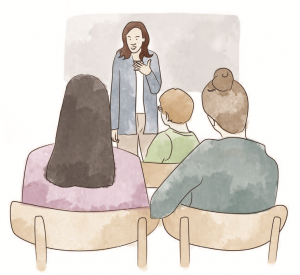
Expand
Community of practice
We have professionals who have completed Pictability Facilitator training in Australia, New Zealand, Canada and Finland. Representatives of these countries engage with us at a strategic level. Our next step is to connect all the professionals as a communities of practice so that they can continue their discussions on building family capability through participation.
Our aim is that trained professionals communicate and collaborate. These practitioners will plan joint training and research activities. Some people are interested in publishing in peer-reviewed journals, others prefer to focus on setting up best practice in their respective organisations. We support both these directions and are planning to carry out some International Master Classes.
These collaborations have started informally through international research initiatives headed by Dr. Annick Janson, our Research Director. Please contact her on annick@egl.ac.nz for more information or to register interest.
Work on building this community of practice is in progress.
Peer workforce
One goal of the Now and Next program is to identify potential peer leaders, and to recruit and train them into the Peer Facilitators team. This ‘leadership pipeline’ not only allows Now and Next to continue to be led by enthusiastic and impassioned parent peers, but also offers opportunities for parents to re-enter the workforce in ways that are flexible and are meaningful and relevant to their current life experience.
Our Peer Facilitators have naturally taken on leadership roles, both within the Now and Next program, and as an adjunct to it: for example, one peer facilitator has taken her interest in the NDIS to guide other parents with their pre-planning; another facilitates the Circle of Security Parenting program; another writes blogs, grant applications and a variety of other texts for and on Now and Next; another using her theatrical bent to film and edit vlogs of interest to the group; and yet other facilitators (who are fluent in languages other than English) run Vietnamese, Korean and Arabic Now and Next groups.
These Peer Facilitators have become the public face of Now and Next. Not only do they attend conferences of relevance to NANA, but they are also invited to present at conferences. For example, two facilitators talked about Now and Next at the 2017 ‘Belonging Matters’ Conference in Melbourne in 2018. Facilitators have joined their service provider’s management [plumtree.org.au] to accept awards for the Now and Next program (like when we won the ECIA NSW/ACT Excellence Award for Outstanding Family-Centered and Culturally Responsive Practice), and have represented our initiatives during meetings with local MPs.
Whilst its peer workforce was initially established in response to a need for peer facilitators for Now and Next, Plumtree has since recognised the broader potential of a peer workforce in the ECI sector, in which attracting and retaining allied health professionals and educators is increasingly challenging. With the NDIS rollout in Australia, the current traditional allied health workforce is unlikely to meet demand for allied health services. The peer workforce also offers a complementary and necessary link to the support families provide each other, especially in the early years. Since 2015, then, Plumtree has increasingly identified and maximised the many benefits that peer workers can offer to families and the allied health workforce. Thus, Plumtree’s peer workers now facilitate many new peer-led service delivery options to build family capacity and have also offered services in multiple languages to ensure culturally-sensitive service options are offered to culturally and linguistically diverse (CALD) families who might otherwise be excluded. It is in this context of an active peer workforce that Plumtree has undertaken this project.
Alumni peer network
When families share with each other, they build capacity as a group. New evidence informed processes can provide the basis for beginning to build family understanding. However, continuity is required to maintain the momentum and to ensure sustainability. Harnessing this collective energy is required to grow a network on which to build a social movement Kendrick (2010), and to create mechanisms to nourish and inspire families throughout the lifespan to continue to create a better future for their child and their family. Our work outlines the benefits of families coming together as early as possible in their journeys to take control of their future.
Once families have completed the group program, they join the Now and Next Alumni Network which provides an ongoing mechanism for peer support amongst families who share the common experience and understanding offered by the program. Plumtree is incubating this social movement to harness the collective capacity of families at the earliest possible point in the families’ experience. The network’s collective agenda and long-term vision is to build a social movement to inspire a new generation of parents of young children with disabilities to lead their family’s progress, drawing from a sustainable and deeply embedded peer-networked foundation of knowledge, capacity and creativity. The network’s first Family Conference took place in April 2017.
Developing the leadership of families who have young children will create a significant impact on the long-term outcomes for children, families and communities (Moore & McDonald, 2013). Our mechanism offers a structured approach to developing a leadership pipeline where families of young children are identified as potential peer leaders, then provided with training and support to become paid peer mentors to deliver a set curriculum. Moreover, graduates of the program become alumni members who have access to regular online and face-to-face opportunities to connect, which provides them with ongoing information, inspiration and support into the future. This alumni network provides a sustainable peer-led vehicle to keep families connected to one another through intentional capacity-building opportunities. Empowering families creates the environment where families act not only to advance the best interests of their child and family, but also to strengthen their capacity as a community.
Family Conference
The Family Conference brings together, informs, and inspires families of children with disabilities and their allies on taking the lead and building a good life.
Created at Plumtree in 2017, the conference is planned and run by families, for families. Originally held at our centre for 50 parents, the event has since moved online with attendees from over Australia.
Conference guests include professionals, parent peer workers, as well as families, and young people with a disability.
Their uplifting presentations educate and empower attendees on topics from achieving great goals, getting the best from the NDIS and professional partnerships, building family agency, and more.
See the Family Conference resources here
Collective benefit mindset
When individual wellbeing improves we are able to turn our attention to the wellbeing of the collective. This concept known as the Collective Benefit Mindset was developed by positive psychology and is based on Carol Dweck’s fixed/growth mindset approach.
We are building our publications on how a collective benefit mindset might emerge concurrently with the formation of our emerging alumni groups. These include the following papers and presentations:
- Janson, A., Mahmic, S., Benge, T. & Herbert, C. (2018) How a transformational Collective Benefit Mindset experience prompted parents raising children with disability to launch a peer network. [Submitted for peer review; pre-publication proof]
- Benge, T., Herbert, C. & Janson, A. (2019) Family-lead peer network formation: Translating knowledge across cultures. International Society on Early Intervention (ISEI), Sydney, Australia (June 25-28).
- Janson, A., Mahmic, S., Benge, T. and Herbert, C. (2018) Positive parent education for families raising children with disability: Supporting the emergence of a Collective Benefit Mindset. New Zealand Association of Positive Psychology 4th Biennal Conference in Positive Psychology, University of Waikato, Hamilton, New Zealand (24 Novembre).
- Barton, H and Benge, T. (2018) Now and Next: A novel partnership between families and professionals. NZDSN Wellington, New Zealand (April 11-12). Hori Barton is a father who completed his training as a Peer Facilitator and continued to facilitate his first Now and Next program shortly thereafter. Please click on the video below to see Hori’s presentation at 46’48.
Evaluate
We have selected a suite of robust assessment tools to evaluate the impact of the Now and Next program on participants. We are also undertaking a range of qualitative and quantitative research projects that together will help us formulate our Theory of Change.
The Centre for Community Child Health (the Centre) at Murdoch Children’s Research Institute (MCRI) was commissioned by Plumtree to undertake a process and outcomes evaluation of the Now and Next program. The evaluation looked at data for the 15 Now and Next groups that were run between January 2017 to March 2018 and involved 154 families of young children birth to eight years old who have disabilities or a developmental delay.
The purpose of the evaluation was to examine the Now and Next program and identify participant outcomes to inform decision-making about the future strategic direction and implementation of the Now and Next program. The evaluation used a mix of qualitative and quantitative methods to undertake both a process and outcomes evaluation of the Now and Next program. The process evaluation looked at whether the Now and Next program had been delivered as intended, if it was reaching the target groups and how participants rated the program. The evaluation looked at participant outcomes, in particular, if participants had achieved their short-term goals, whether participants had become empowered and if participant wellbeing had grown. Data was collected by the program through online surveys at the beginning and end of the program and during the program by the peer facilitators of the Now and Next program using a participatory action research approach.
External evaluation reference: Moore, T., Fong, M., & Rushton, S. (2018). Evaluation: Now and Next program. Plumtree Children’s Services, Inc. & Murdoch Children’s Research Institute. Parkville, VIC: Centre for Community Child Health. Download this report here.
For a full list of our publications see here: https://tinyurl.com/NN-Theory-of-Change
Demonstrate Outcomes
As our work progresses we report on outcomes. Three examples of building family capability through participation have emerged to date:
1. Families take the lead
As families build their leadership and also continue doing this together in multiple ways, they have found new approaches to express their leadership through collective capacity.
The two Now and Next alumni conferences were an opportunity for families to meet, discuss and formulate the imperative for them to take a lead in contributing to the parent professional relationship. Alumni member Dr. Melanie Heyworth recorded and developed these conversations which were endorsed by participants at the conferences.
- Read about the Parent-Professional Relationship Statement which was developed by families for families at the first Now and Next Alumni conference 2017.
- Read about the Families Leaning into Relationships with Professionals statement which was developed by families for families at the second Now and Next Alumni conference 2018.
2. Nurturing family leadership
In September 2018, Plumtree hosted a 2 day workshop facilitated by Dr Michael Kendrick where we discussed new ideas to build capacity of families who were navigating the Early Childhood Intervention stage. The workshop highlighted the strength in nurturing family leadership and also created a blueprint for change within the ECI sector to support families as their leadership goes from strength to strength.
Participants in the 2 day workshop:
- Discussed the role of families and service providers in nurturing family leadership.
- Identified the need to promote new approaches in ECI and to expand these innovations with integrity.
- Documented next steps to further new approaches state-wide, nationally, and internationally.
Plumtree places great importance in incubating such new approaches to support family and peer leadership in the community. We continue to invest in our peer team and programs as this movement gains momentum on a global stage. Dr Michael Kendrick is an internationally recognised educator, advocate, consultant and author.
3. Researching participatory pathways
What does it mean for families to lean in and take an active role in relationships with professionals? We are testing practical new ways for families to participate in this relationship and be supported by professionals who embrace this new level of involvement.
Pictability is a participatory tool that supports greater involvement. The role of early intervention professionals is then to guide families to write their vision statement and then coach them to present this to people in other environments, so that they build confidence to share their vision and establish this as a foundation for parent-professional collaboration to achieve their short and long term goals.
We call this novel partnership the Family Participatory Pathway. This approach is based on the work of Dunst and colleagues which recommends that ECI professionals extend beyond ‘relational’ skills to coaching families in ‘participatory’ family-centred practices. Participatory practices are defined as “behaviour that actively involves family members in (a) informed choice and decision making, and (b) using existing strengths and abilities as well as developing new capabilities needed to obtain family-identified resources, supports, and services”. Participatory practices also include “practitioner responsiveness to and flexibility in how help is provided to children and their families” (Dunst and Trivette. 2009).
Parents of young children undergo at least two main transition points: transition to early education settings and transition to school. Each transition offers the opportunity for parents to gain skills around formulating their vision and the type of support that best match their needs. These are opportunities for families to rehearse participatory skills in a safe and supportive environment. At each of these transition points, families will be guided to:
- Formulate their vision statement using elements of the Pictability and Goal to Action tools used during the Now and Next program
- Rehearse presentation of their vision to a practitioner in a supportive environment
This research project is being conducted in Canada with Kinsight and was presented at the Early Years Conference, Vancouver [Jan 30 – Feb 1 2020] by Williams, G. & Janson, A. . It is titled: Testing a novel parents’ participatory pathway.
4. Collective capacity
Promoting family leadership through new parent led organisations.
Currently, in Australia there is no parent led organisation that supports families of very young children, which is not disability-specific. Plumtree has received funding to auspice two new parent led organisations which will be fully independent once set up.
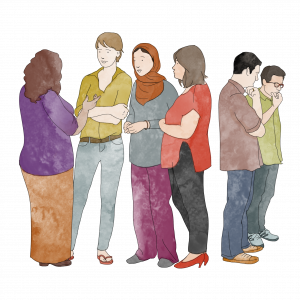
Overview of Now & Next
Now & Next is a unique, peer-led group program for families of young children who have developmental delays or disabilities.
This program has evolved to become a cornerstone of the early childhood intervention (ECI) service delivery at Plumtree. Now & Next is grounded in Positive Psychology and Post post-traumatic growth (PTG) theories, but it also utilises the demonstrated benefits of gamification and mindfulness and builds on best practice research into family-centred practice. Now & Next is the first totally ‘by families, for families’ program of its kind to be offered in Australia and worldwide. By challenging the traditional ‘grief’ mindset often associated with disability and replacing grief with the concept of overwhelm and the promise of growth, Now and Next supports families to engage in authentic, creative visioning for their disabled child and for themselves.
Since its inception in 2015, over 400 families have participated in Now & Next. It was initially led by both peer family facilitators and professionals, but it is now led solely by peer facilitators. Families from culturally and linguistically diverse backgrounds total 48% of the participants. Fathers’ engagement ranges between a quarter to half of participants, depending on the activities organised. Groups have been run in Vietnamese, Korean, Arabic and Chinese. The program begins with a visioning session, followed by an 8-week, 2.5-hour per week, or a 4 full-day protocol. Program elements are aimed at progressing children’s goals by engaging their families. Through interactive group work, the program supports families in envisioning, planning, setting goals, and developing goals into action in the context of a peer-led environment.
Written by Dr. Melanie Heyworth. Please click Centre for Welfare Reform for the full document.
Evidence Base
Dr. Melanie Heyworth composed the below summary of the evidence base that informed our development.
Martin Seligman launched the science of positive psychology, which builds on existing research but adds new dimensions and foci to it. Positive psychologists strive to add value by focusing on building a positive future, to complement other more traditional approaches which focus on the past. Positive psychology is the science of ‘flourishing’. We embedded these evidence-based concepts into our approach for Pictability© and Now&Next, which utilise the cornerstones of positive psychology, including empowerment, hope and wellbeing.
Prospection is the positive psychology view of planning. When people engage in ‘prospection’, they think with hope for the future. In Pictability©, families create a hopeful vision for their family, their child, and themselves. Prospection is achieved by participants choosing cards and placing them on the Vision Board. During this process, parents may experience ‘flow’, which was described by positive psychologist, Mihaly Csikszentmihalyi.
In his seminal work, Flow: The Psychology of Optimal Experience, Csikszentmihalyi outlined his theory that people are happiest when they are in a state of ‘flow’, that is, a state of concentration or complete absorption within an activity. When people are profoundly involved in an activity – as they are during Pictability© – they experience ‘flow’. The idea of flow is identical to the feeling of being ‘in the zone’ or ‘in the groove’. The flow state is an optimal state of intrinsic motivation, where the person is fully immersed in what they are doing. This is a feeling everyone has at times, characterised by a feeling of great absorption, engagement, fulfillment, and skill.
The ‘Post Traumatic Growth’ (or PTG) theory explains how we can emerge from challenging situations stronger and more resilient than we were before we faced that challenge. The theory was originally described as understanding the positive growth we experience because we have struggled with a highly challenging life circumstance, not despite a highly challenging life circumstance (Tedeschi & Calhoun, 2004). PTG is thus distinct from hope and optimism, in that it links personal growth to the experience of trauma and stress. PTG explains that Nietzschean idea, that what doesn’t kill us, makes us stronger (Jayawickreme & Blackie, 2014). PTG emphasises engagement, empowerment and hope, since it offers the promise of growth and positive transformation from otherwise distressing or traumatic life events.
All of the aforementioned theoretical principles, however beneficial, are not particularly useful if participants are not motivated to engage in the content of Now&Next. As Mora and colleagues (2016) rightly point out, ‘both engagement and motivation are important factors in any learning process’. That is why we have used gamification (sometimes known as ‘serious gaming’) to make sure that Now&Next is not only theoretically rigorous, but also enjoyable and engrossing – that is: engaging – for participants (Surendeleg et al., 2014; Tulloch, 2014).
The final key theoretical foundation for Now&Next is mindfulness. Kathryn Adair and Barbara Fredrickson (2015) define mindfulness as non-judgmental present-moment attention and awareness, which varies across persons and moments. The purpose of mindfulness, then, is to ‘foster greater attention to and awareness of present moment experience’ (Creswell, 2017), although a crucial aspect to mindfulness is to approach such attention without judgement.
Mindfulness is well evidenced to reduce stress and alleviate suffering, including stress, depression and anxiety (Liu et al., 2015), all of which are significant risks for parents of children with disability and developmental delay. Moreover, research suggests that mindfulness may improve social relationships, increase resilience, and promote emotional regulation (Brown, Ryan & Creswell, 2007). Indeed, mindfulness is connected to greater ‘inner peace’, by helping us to ‘re-perceive’ our experiences with clarity, objectivity and perspective, as well as promoting self-acceptance through inviting us to accept without judgement our emotions and thoughts (Liu et al., 2015).
The impact of mindfulness on mental health, then, is significant (Brown, Ryan & Creswell, 2007). Through mindfulness, we centre our attention on the present, we accept our experiences, we achieve clarity about those experiences, and we learn to manage negative emotions. This resilience for managing negative emotions in turn allows us to have perspective about the relationship between our wellbeing and external events or outcomes, decreasing psychological distress and increasing flourishing (Coffey, Hartman & Fredrickson, 2010). Mindfulness is a concrete process by which we can access and implement ways of thinking that actively build functioning optimism and hope: as Ellen Langer suggests, mindfulness asks us not just to expect bad things to pass, or to see the ‘silver lining’ in any particular negative event, but to understand that we control the context or the lens with which we interpret those events, which have the potential to be positive and negative, depending on how we frame them.
Specific mindfulness activities have been demonstrated to increase positive emotions. These mindfulness activities promote what is called ‘state’ mindfulness (that is, a moment during which we engage deliberately in a mindfulness activity, or we enter into a momentary state of mindfulness). However, some people are predispositioned to have ‘trait’ mindfulness (that is, a general predisposition to be mindful in everyday life). It is such ‘trait’ mindfulness which most improves emotional wellbeing (Fredrickson et al., 2017). Not all Now&Next participants will be predisposed to ‘trait’ mindfulness, but research suggests that ‘trait’ mindfulness can be taught or increased with the practice of ‘state’ mindfulness, or mindfulness activities (Kiken et al., 2015). You will find specific mindfulness activities throughout Now & Next. We hope that by increasing greater ‘state’ mindfulness, over time our participants will increase or grow their ‘trait’ mindfulness, which in turn will improve their mental and psychological health.
Importantly for Now&Next, there is a significant connection between mindfulness and PTG. If PTG argues that deliberate rumination (or cognitive engagement) on stressors allows us to understand and grow from traumatic events and experiences, then mindfulness is a method by which we can positively reappraise those events, give them meaning, and increase our wellbeing (Tedeschi & Blevins, 2015). Mindfulness is also a tool by which we can gain accurate self-knowledge (Carlson, 2013), key to a strengths-based approach, achievable prospection, and PTG. Again, the interconnection between the theoretical principles underpinning Now&Next are apparent.
For the full document, please click here.

